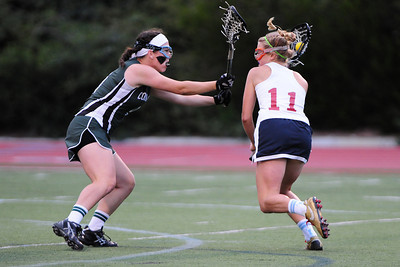Killing Myself Slowly and My Decision to Live
 I have always been an athletic person who was very healthy. I swam competitively for over 10 years until I committed to play lacrosse in high school. My dream was to play college lacrosse at the Division 1 level, and I was able to get a scholarship to UC Davis. I broke my foot in two places during our last preseason scrimmage of the season and had an extremely hard time recovering. I was constantly very sick with the flu and pneumonia. At one point, I was stuck in the back of a full bus for eight hours, on our way to Oregon for a game. I was unable to hold down any food, had pain all over my body and had absolutely no energy. I remember having to warm-up for our game that afternoon and popping at least six Advils from our trainer just to get through the hour. I felt like my body was shutting down.
I have always been an athletic person who was very healthy. I swam competitively for over 10 years until I committed to play lacrosse in high school. My dream was to play college lacrosse at the Division 1 level, and I was able to get a scholarship to UC Davis. I broke my foot in two places during our last preseason scrimmage of the season and had an extremely hard time recovering. I was constantly very sick with the flu and pneumonia. At one point, I was stuck in the back of a full bus for eight hours, on our way to Oregon for a game. I was unable to hold down any food, had pain all over my body and had absolutely no energy. I remember having to warm-up for our game that afternoon and popping at least six Advils from our trainer just to get through the hour. I felt like my body was shutting down.
My teammates and friends noticed how sick I always was, but I could never figure out what was going on. Eventually, I transferred from UC Davis and had made the decision to go to Gettysburg to continue to play. That summer, I worked my ass off. I was losing weight, working out twice a day and feeling great. I still had lingering foot problems, but I pushed through it.
About two months before I started at Gettysburg, I went to the doctors to get a physical that was required for the athletic program. A urine test, blood work and a series of questions and I was out the door. I had a call back the next day that there was a lab error in the urine test, so I went back for another one. A few days later, I was called in to see the doctor. She told me that there was an abnormal amount of sugar in my urine, which meant that I was a person with diabetes. My average blood sugar levels over the past three months had been over 400. A non-diabetic’s levels range around 100. I can honestly say that my first reaction was laughter. I said, out loud, there’s no way. The denial began.
The next weeks were a combination of refusal and shock. Every day, I got about three different blood tests to check, re-check and triple check that these results were not an error. I forced my doctor for any possible explanation. I asked to see other doctors. I called every single relative from my mom and dad’s sides to make sure that there was no history of diabetes. As more tests came in, I was officially diagnosed as a person with type 1 diabetes.
My shock turned into rage and anger. Why did this have to happen to me? How did I get a disease that was “genetic”? Where were the symptoms? I was so angry at diabetes.
One of the many doctors guessed that my type 1 diagnosis was caused from the period of time in college when I was extremely sick and unable to heal my broken foot. The breakdown in my immune system somehow turned a switch in my body to attack my pancreas and shut down the flow of insulin. He also said that I had probably been diabetic for years and never was properly diagnosed.
At first, I was an expert at controlling my blood sugar levels. I finger pricked five times a day, injected at every meal, and was always aware of my caloric intake.
Two months had passed very quickly and soon I was on a plane to a new college where I knew absolutely NO ONE. Plus, the fact that I was newly diagnosed with a lifelong disease that still confused and scared the hell out of me was daunting.
I came to school and became immersed into the atmosphere and social scene. I stopped caring about my diabetes. Everything was so new at that time and I was still in denial. I still couldn’t believe what had happened or why I had to be the one with it. I was embarrassed about injecting in front of people or finger pricking in class. I stopped taking my medicine. I was drinking heavily all the time. I still ate somewhat healthy, but I had no problem indulging with anything. I felt the symptoms greatly. I was constantly fatigued, dizzy, extremely thirsty and nauseous. Eventually, I got used to the feeling.
The next year and a half, I was horrible to my body. I rarely took my insulin injections and checked my blood glucose levels. I was so used to having no energy that I became addicted to coffee and caffeine tablets to stay awake. I HAD to take a nap every day, sometimes two, in order to make it through classes. I had to go to bed as early as possible or else I could not function mentally or physically. The only thing that was keeping me somewhat healthy was that I exercised daily.

I was hospitalized three times while I was at Gettysburg, one of which involved an ambulance and an extremely scary experience. All of these visits were related to diabetes. My senior year, I got pneumonia for the second time and I felt the exact same way as I did at my old school freshman year. I couldn’t stay awake for more than an hour, could barely make it to my classes, and was too tired to eat or shower. The sickness paired with my lack of care for my diabetes was one of the most painful things I have gone through. The denial and refusal to care won over my health and I didn’t realize how much I was hurting myself.
I came home from college and got the biggest reality shock of my life. My doctor ripped me a new one when he saw my blood work results. He told me I was killing myself, slowly but surely. He said my refusal to commit to this disease and take care of myself was shutting down my body and leading me to serious symptoms (blindness, leg/arm amputations, kidney disease, thyroid issues). I couldn’t hide that I was ignoring my health because the numbers don’t lie.
Looking back on it now, I feel like such an idiot. I let my laziness, embarrassment and worry take control of my health and my life.
The fact that I have type 1 diabetes is never going to change. Every day, I am learning to embrace my “difference” and move forward. I learned to see diabetes as a challenge that I have to rise to each and every day. This disease has empowered me to focus more than ever on my health. I am constantly aware of everything that I put into my body and how that will affect my blood sugar. I wear a continuous glucose monitor, which is attached onto my body and automatically checks my blood sugar levels every 15 minutes. I am able to look at a plate of food or alcohol and know how many carbohydrates are in it and how much insulin I need to take. With this education and understanding, I have learned to better manage my diabetes.
Yes, there is constant monitoring involved: finger pricks, injections, ketone testing. It’s tedious, annoying and frustrating, but I was done feeling sorry for myself. Sometimes I cannot explain why I take all of my medicine correctly and my body still does not cooperate, but I’m learning every day how to feel better.
I am not going to lie, I still get frustrated and emotional. Some days, I go back into the denial and anger that I felt the first months I was diagnosed. I see the bruising on my injection sites and I get so upset. I go out and drink excessively or eat a sugary meal and don’t think anything of it. But I am reminded of the symptoms and sickness that I felt during that time and I bounce out of that mindset.
I tell myself that I am stronger than I think, and more capable than I know. That is true in any situation, and whatever emotional roadblock that you encounter. Our differences are what make us stronger. How we chose to wake up in the morning and attack each day is under our control. We are all in control of our own happiness, and that starts with taking care of yourself and treating your body like the beautiful temple that it is.
The fact is that I had to save my strength for things that I could change. I can’t change my type 1 diabetes, so I embrace it. I am proud of it.





